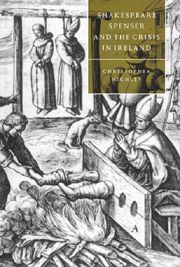Book contents
- Frontmatter
- Contents
- List of illustrations
- Acknowledgements
- Introduction: Elizabeth's other isle
- 1 Spenser's Irish courts
- 2 Reversing the conquest: deputies, rebels, and Shakespeare's 2 Henry VI
- 3 Ireland, Wales, and the representation of England's borderlands
- 4 The Tyrone rebellion and the gendering of colonial resistance in 1 Henry IV
- 5 “A softe kind of warre”: Spenser and the female reformation of Ireland
- 6 “If the Cause be not good”: Henry V and Essex's Irish campaign
- Notes
- List of works cited
- Index
- Cambridge Studies in Renaissance Literature and Culture
Introduction: Elizabeth's other isle
Published online by Cambridge University Press: 04 December 2009
- Frontmatter
- Contents
- List of illustrations
- Acknowledgements
- Introduction: Elizabeth's other isle
- 1 Spenser's Irish courts
- 2 Reversing the conquest: deputies, rebels, and Shakespeare's 2 Henry VI
- 3 Ireland, Wales, and the representation of England's borderlands
- 4 The Tyrone rebellion and the gendering of colonial resistance in 1 Henry IV
- 5 “A softe kind of warre”: Spenser and the female reformation of Ireland
- 6 “If the Cause be not good”: Henry V and Essex's Irish campaign
- Notes
- List of works cited
- Index
- Cambridge Studies in Renaissance Literature and Culture
Summary
In the reign of James I, Sir Thomas Wilson, the Keeper of the Records at Whitehall, claimed to have discovered in the State Paper Office, “more ado with Ireland than all the world beside.” The massive archive of Irish materials was initially built up in the 1580s and 1590s when English efforts to reform, settle, and reconquer Ireland necessitated an increasing volume of correspondence between the court and the Irish administration. Yet this official collection of letters, manuscript tracts, surveys, and maps – large as it is – constitutes only a fraction of the Elizabethan discourse about Ireland, where intractable conflicts provoked debate in “literary” works, including epic poems, public plays and court masques, as well as in more ephemeral material like ballads, proverbs, jokes, and graffiti. The following study does not attempt a comprehensive survey of these multiple voices but focuses mainly upon the canonical figures of Spenser and Shakespeare, examining how their works both shaped and were in turn shaped by the larger English discourse about Ireland. Writing from, respectively, within and without Ireland, and from distinct cultural and institutional locations, Spenser and Shakespeare take up the vexed issue of English interference in Ireland, elaborating imaginary solutions to what the English continue to think of as the Irish “problem.” Because my study is about English representations of Ireland, I inevitably explore English perspectives that see the war as an Irish “crisis” caused by Irish “rebels.” English “perception” itself, though, is a large part of the “problem,” part of the legerdemain of imperialist enterprises. We must always be aware that within their own culture, the Irish who resisted English domination were not “rebels” but freedom-fighters or “men in Action.
- Type
- Chapter
- Information
- Shakespeare, Spenser, and the Crisis in Ireland , pp. 1 - 12Publisher: Cambridge University PressPrint publication year: 1997

